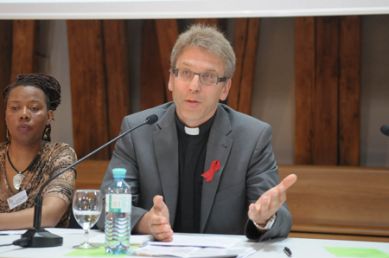Multi-faith Delegation Sets Common Initiative to Battle AIDS

Leaders from the world's most prominent faith traditions have agreed to put aside differences for the sake of uniting in a common battle against HIV/AIDS.
Some 250 leaders of Christian, Muslim and Jewish faiths gathered in Vienna, Austria this weekend for a pre-conference to the 18th International AIDS Conference which began on Sunday.
The leaders discussed how faith traditions can assist in achieving universal access to HIV treatment, care, support, and prevention.
The Rev. Olav Fykse Tveit, general secretary of the World Council of Churches (WCC), challenged the question at the heart of the conference, 'HIV: What's faith got to do with it?'
"The question is odd," Tveit said. "If we replace HIV in that question with any other disease, why shouldn't faith compel us to do everything we possibly can to tackle the disease?"
"Our faith compels us to act and not to get stuck in discussions we don't need, such as about sin," he added.
Kezevino Aram, director of the Shanti Ashram in southern India and a practicing Hindu, said that religious leaders need to build community as a vaccine against the social and personal consequences of the virus.
"The moment you divide a community, the moment you say that some are more vulnerable or at risk, that division allows for apathy, stigmatization and dehumanization," Aram said.
Kevin Moody, CEO of the Global Network of People Living with HIV, meanwhile, made a point to show how the faith community has not always been so helpful in fighting the discrimination AIDS victims face.
Citing statements from Christian leaders such as Mother Teresa and Pat Buchanan, as well as the Islamic Medical Society of South Africa, Moody said that the quotes show how opinion shapers can exacerbate the stigma placed on AIDS victims.
Moody also noted that despite a lot of progress, religious leaders continue to be complicit in some geographic regions in worsening the suffering of people living with HIV and AIDS.
"Homophobic laws are today being written in Africa because there are missions from Europe and North America going to those countries and advocating for the criminalization of homosexuality," he said.
Affirming Moody's point, Jan Beagle, deputy director of UNAIDS, declared that such "punitive laws" against AIDS victims should end and added that the framing of the "innocent and guilty" in public debate is an "affront to universal human rights."
"Sometimes we can find ourselves with very different perspectives on these thorny issues," she said, "and we need to strive towards dialogue and approaches that work to save lives, that empower people living with HIV, women, and marginalised groups within societies to take leadership roles within their communities to eliminate stigma, discrimination and violence."
Speaking after the conference, Veena O'Sullivan, HIV Unit Manager for Christian development agency Tearfund, admitted that the church's record is not "unblemished" on the issue of AIDS.
"Judgmental attitudes, which see HIV as a punishment for sin and immorality, have contributed to creating another epidemic – of stigma and discrimination," Sullivan said. "HIV is not a moral judgment but a virus that can affect anyone."
"It is vital that the church acknowledges and addresses harmful attitudes where they remain," she said.